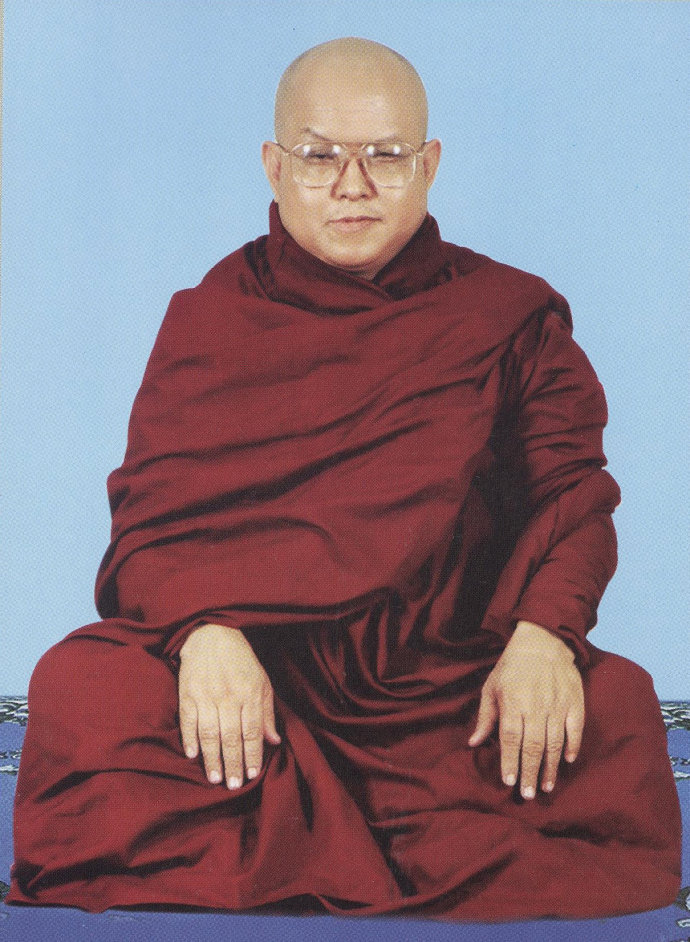作者:Ksitiputra
2016年10月7日下午,我在持三藏尤大师的弟子,仰光班迪达禅修中心一位尼师的协助安排下,与两位法友前往缅甸仰光的一家佛学院「大净住寺」(Mahavisuddharama TaikThit Monastery),参访著名的持三藏大师(Tipitakadhara)尤尊者(Yaw Sayadaw U Sirindabhivamsa),询问禅法上的问题,为同行的法友解除修行上的疑惑。

尤大师法相(Yaw Sayadaw U Sirindabhivamsa)
(生于1943年 – )
(有关大师的详细生平资料,请参阅最下面的英文参考資料链結)
这次前往参访尤大师,主要是因为随行的法友,早几个月前曾接触过一派缅甸禅法,主张禅修必须要能够入禅定,并以禅定的光来观察过去及未来世,以及观察粒子(kalapa,或「色聚」)方能够解脱,没有能够做到观前后世及粒子的,绝不能够解脱。由于主张此说的一派,声称其说法严格按照巴利三藏的内容所述,法友于是大感困惑,因为以往从来没有听过这种说法,让他无所适从。因为尤大师精通三藏,对三藏及注疏的熟悉程度,于教界内无出其右,关于这个问题,相信除了我的法友,还有很多海内外的禅修界朋友,同样会感到困惑,因此我希望借着尤大师的解答,让一切疑惑冰销,修行可以重回正轨。为了便于阅读,我这里以对答形式列出我当时所提的问题及大师的回答:
尤大师对以下问题的回答:
1. 修行解脱是否需要观察「前世」及「后世」(过去生及未来生)?
尤大师:不需要,只需要观察「当下」名色法的生灭,过去的已灭,未来的未出现,过去的已经过去,真实的只有当下出现的一刻,透过一直观察当下的生灭,便能证得出世间的「道智」与「果智」。
2. 修行解脱是否需要观察「粒子」?
尤大师:不需要。
3. 请问大师如何知道所证的「道智」并非如「有分心」一样的无意识?(提此一问是因为有指内观行者所证的身心俱灭,只是堕进有分心」)
尤大师:有分心是睡眠的状态,证得「道智」与「果智」与「有分心」很不同,当禅修者观察身心当下的生灭,突然一刻证得道智,他是会清楚知道,一刻「道智」出现了,接着下来是「果智」出现了几刻,他会知道这是「解脱」,不同有分心,这难以用譬喻来说。
4. 在「无我相经」中,提到过去未来的五蕴,应如何理解?
尤大师:那是透过观察当下,推理而知过去及未来也如此。
5. 请问大师所修的禅法,是否从属缅甸某个派系?马哈希、宣隆等?
尤大师:我只有从佛陀学禅修。(意指他并没有跟随任何派系的大师学禅修。)
6. 请问大师所修禅法为何?出入息吗?观腹部吗?
尤大师:我有修出入息、慈心禅。另外就是观察不同的心--心念处。烦恼是从心起的,观色法的话,色法本身没有烦恼,是心才带着烦恼。当智慧升起,禅修者可以分别善的心和不善的心,它们是一排一排地出现的,当知道善的心出现,保留储存它们,当不善的心出现,则驱除它们。我是以观察心为主来修行的。
7. 观心法比观色法重要吗?
尤大师:都一样,观察色法也可以,烦恼多的人可以多观心,因为烦恼伴随心出来。
当笔者欲进一步问大师观心的技巧内容时,大师因为事忙,并没有继续回答,并为我们送上慈心的祝福。我们在那一刻,均被大师的德力所摄受,被一种无比的触动包围着。大师最后说,他在雪奥敏禅修中心有做开示,那儿是禅修与教学并重的地方,说以后学禅可以去那儿。同行的尼师表示,大师平日很少这么长地对外来的人开示,她觉得这次因缘颇特别。大师其实最初并没有意思回答我的提问,他说我们同行的尼师是「法阿阇黎」,有问题可以问她。不过可能因为后来听到提问的禅修问题颇深入,他不厌其烦地详细解答。
大师在对话中,用很多话来描述他修证的经验,不过我们可惜并未能够逐字记下,当时也没有意识到要录音,后来尼师拿手机录音,已经是对话很后的部份了,不过笔者很记得大师说话时的模样,他用手在比划那个时候的经历,在说缅文生灭的字眼。他所说的都是其所证得的体验。这里所载的文字,连当日所说的四分之一也没有。希望他日可以再拜见他询问更多关于禅法的事。
此外,笔者过去亦曾经于2012年拜访过另一位持三藏大师--宣隆内观中心总部的孙达拉大师(Sayadaw U Sundara),不过当时的英文翻译并不好,致使没有机会详细问深入的东西,但是当时我也曾询问他,关于用禅定的光观粒子等事,他的回复也是内观并不需要。2013年我在新加坡,亦曾见过「二藏法师」(Dvipitakadhara)提扎那禅师(Sayadaw U Thitzana),他是教导马哈希禅法的导师,同时也曾学过宣隆禅法,因此他的教法也是观当下的名色法。
由此可见,这些精通三藏的大师们,都是认为观察当下的名色生灭便能解脱的,而不用观过去未来世,这一点我们必须注意,因为真实只存在于当下出现的一刻,过去的灭了,如果以任何方式再出现,那个过去的现象必定是虚妄;一位缅甸的阿毗旺萨这样形容给我听,就如同已逝去的拿破仑,他已过去的身心能够再生吗?显然是不可能。有关于观过去未来世是在观察「虚妄」现象的问题,笔者日后会再详细撰文阐述。
参考資料:
1. http://www.myanmarnet.net/nibbana/tipitaka/tpdkdhra.htm
持三藏尤大師的英文履歷資料:
Venerable Yaw Sayadaw Ashin Sirindabhivamsa was born to father U Ye Naing and mother Daw Toke Khaing on Friday, March 26, 1943 (*the 6th Waning day of TaBaung, 1304 M.E.) in LetPan Village, GanGaw Township of MaGwe Division (now MaGwe Region).
1952-53 * At the age of ten, he studied elementary Pali Grammar and literature, Myanmar literature, Mathematics and Buddhist culture from LetPan Kyaung Sayadaw Venerable U Tissa.
1953-54 * He passed the examinations while he was attending the State Primary School at LetPan Village.
1956-57 * At the age of 14, the novitiation ceremony was held with his parents as the supporter of requisites, and he became a novice (Samanera) with LetPan Kyaung Sayadaw Venerable U Tissa as his preceptor (upjjhaya).
1959-60 * He stood first in the Buddhist Examination. He was the only one in the school who passed the Seventh Standard in that year.
1.6.1960 (the 8th Waxing Day of NaYon, 1322 M.E.) * He was novitiated for the second time with Pathama KanTawYa Sayadawgyi as his preceptor (upajjhaya). Sayadawgyi gave the name of the novice as Shin (Novice) Sirinda to convey the auspicious meaning “the ruler of the glory and splendor”.
1961-1963 * The young novice studied and learnt Pali Grammar, AbhiDhammattha-sangaha, Fundamentals of Tipitaka such as Patimokkha, Pali Writings, Pali verses and Composition of Poems from the teachers such as Ven. Kelasa, Ven. Nandiya and Ven. Sakinda. He had marvelously completed his studies within two years.
May 26, 1962 (the 8th Waning day of KaSon, 1324 M.E.) * The novice was fully ordained with KanTawYa Sayadaw Ven. Visuta as his preceptor (upajjhaya). The higher ordination (upasampada) ceremony was held with the material support of his parents, U Ye Naing and Daw Toke Khaing, and he became a monk with the name Ashin Sirinda.
1962-1967 * Sayadaw studied Pali Tipitakas, Atthakathas and Tikas for five years in Mandalay.
1967 *
1962-63 * He passed pathamagne Examination held by the Government.
1963-64 * He passed PaThaMaLat Examination held by the Government.
1964-65 * He passed PaThaMaGyi (First Grade) Examination held by the Government.
1966-67 * He passed Vinaya Pali Paragu and CetiYangana Examinations.
1967-68 * He passed Dhamma-cariya Examination held by the Government. As he passed the examination standing first in the whole country with the highest marks, Aggamaha-akyaw title was also conferred on him.
1968-69 * He passed Sakyasiha Examination held by the Pariyatti Sasana Association of Mandalay and he stood first. He was conferred the title of Abhivamsa. This title is conferred only on a candidate who has the highest level proficiency in Pali Tipitakas, Atthakathas and Tikas before the age of 27.
1969-70 * He passed the Ceiyangana Dhammacariya Examination.
1970-71 * He passed Sakyasiha Dhammacariya Examination and he stood first with distinction. He was conferred the prestigious title of Abhivamsa. In the same year, he was conferred the title of Vinayadhara-Vinayakovida as he had passed both written and oral examinations for which Five Vinaya Books are prescribed.
1971-72 * He passed the oral examination in the first part of AbhiDhamma Examination for which Five AbhiDhamma Books are prescribed.
1972-73 * He passed Sakyasiha Nikaya Examination for Silakkhan dhavagga. He also passed Patisambhidamagga Paliparagu
1973-74 * He passed Vibhangadi Distinction Examination in Myanmar. He also passed Suvannabhumi Pariyatti Examination held in Thaton.
1974-75 * He passed the examination in the first part of AbhiDhamma Examination for four AbhiDhamma Books and stood first, and also passed the oral examination with distinction. He passed the written examination in the first part of AbhiDhamma Examination for which Five AbhiDhamma books are prescribed.
1976-77 * He passed the examination in the second part of AbhiDhamma Examination for two volumes of AbhiDhamma. In the same year, he was conferred the title of AbhiDhammika – AbhiDhammaKovida as he had passed both written and oral examinations for AbhiDhamma.
1978-79 * He passed the oral examination for three volumes of Dighanikaya of Suttantapitaka. Accordingly Sayadaw was conferred the title of Tipitakadhara, the seal and the certificate. He also received the pennanton which the emblem of three white umbrellas with red stems is printed.
1984-85 * In 37th Tipitakadhara Selection Examination, he passed the written examination for three volumes of Dighanikaya of Suttantapitaka as prescribed by the Tipitakadhara Selection Board.
Sayadaw was conferred the title of Tipitakadhara-TipitakaKovida, the seal and the certificate. He also received the pennanton which the emblem of three white umbrellas with yellow stems is printed.
1989-90 * Sayadaw received the prestigious Aggamahapandita title donated by the Government.
1998-99 * Sayadaw received Tipitakadhara-DhammaBandagarika title donated by the Government.
At the present, the Venerable Yaw Sayadaw is strenuously and diligently working for the propagation, promotion and perpetuation of the Buddha sasana. He is currently the Patron and Presiding Sayadaw of the following monasteries:
(1)
(2)
(3)
(4)
(5)
Source :
- Translated by Dr. U Hla Myint (Professor, Faculty of Patipatti, ITBMU).
- Approved by Dr. Nandamala bhivamsa (Rector, International Theravada Buddhist Missionary University) and Venerable Bhaddanta Dr. Chekinda
(Dean, Faculty of Patipatti, International Theravada Buddhist Missionary University).
(转自ksitiputra的新浪博客)